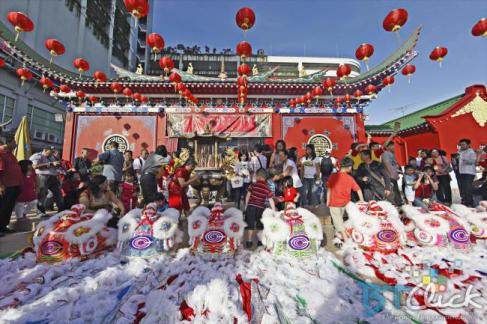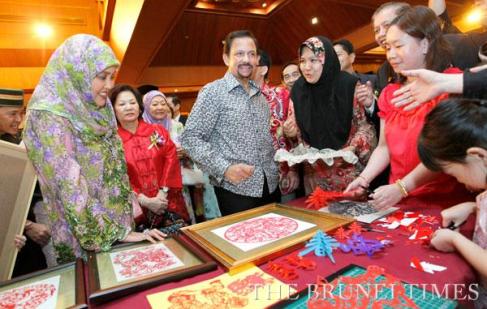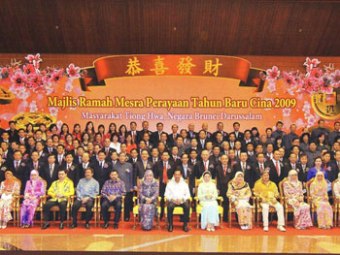He posted some beautiful scenes of the celebration and the daily life of the Chinese community in Brunei on his blog.
He saw colours of red and yellow dominating almost every corner of the country, especially in shopping centres in Bandar Seri Begawan, while firecrackers and fireworks were lit amidst Tarian Singa (lion dances) performances..
The blogger apparently didn’t know that the Chinese community represents ten per cent of the population in Brunei or more than 43,000 people.
China and Brunei have long established diplomatic relations since ancient times. The Chinese settlement in this country can be traced back to more than 1,000 years ago. There was a Chinese figure named Ong Sum Ping who married Puteri Ratna Dewi, the daughter of Sultan Muhammad Shah of Brunei. He was later granted the title of Pengiran Maharaja Lela and elected Chief of Kinabatangan (Sabah).
A Chinese community was found in Kampong Bakut China, Kampong Ayer. In the early 1900s, they began to move their businesses to dry land which is now known as Jalan Sultan.
Michelle Tan, in her article on Chinese in Brunei published in The Encyclopedia of the Chinese Overseas (Harvard University Press, 1999) said that during the 1600s a large Chinese community settled in Brunei.
They were responsible for the trade of gold, pepper, and other spices in the country. In the latter part of the century, however, they were asked to leave the country but came back a century later. They continued to plant pepper and other spices. The first population census in 1911 recorded that there were 736 Chinese in Brunei. By the 1920s, this figure increased to 1,423 people.
Chinese immigration more than doubled as Brunei discovered the existence of oil in 1929. In 16 years (1931-1947), the population of the Chinese community increased by more than 200 per cent. “Chinese from Sarawak, Singapore and Hong Kong who were technically qualified, came to Brunei to look for jobs in the oil industry,” Tan said.
Due to employment opportunities available, the number of Chinese immigration continued to increase until after World War II.
While the number of Chinese immigrants was not as big compared to those in Malaysia, Thailand or Indonesia, they still accounted for one fifth of Brunei’s population in 1947-1981. Based on their origins, the community communicate in different Chinese languages and dialects. The Hokkien (Min Nan) tongue predominates in the Brunei-Muara and Temburong districts, while Cantonese and Hakka speakers are mostly concentrated in the Seria and Kuala Belait areas of the Belait district.
Other Chinese dialects spoken in Brunei include Hoisan, Fuchow and Hainanese. However, they use Mandarin as the lingua franca. It is the common language at the primary level in private Chinese schools and is taught as a subject at secondary level.
The Chinese community in Brunei is made up of those who were from Quemoy (Jinmen) and speak Hokkien, and the rest speak Cantonese, Hakka, Hainanese, Teochiu, Henghua (Xinghua) and others. As in other overseas Chinese communities, these different groups are located in different areas.
To cater their each interests, there are various Chinese associations such as the Belait District Hainanese Association, Brunei Hainan Huiguan, Belait District Fuzhou Association, Belait District Hakka Association, Brunei Guangdong-Huizhou-Zhaoqing Association, Brunei Dabu Association and Chinese Taipei Sojourners Society. Although these associations did not establish any of the eight Chinese schools in Brunei, they make annual contributions to these schools.
Aside from the place-of-origin associations, other Chinese organisations in Brunei are involved with charity, mutual aid and welfare, religion, recreation and sport. There are also a number of associations that deal with their profession such as the Chinese Engineering Association in Belait district which was founded in 1930.
Some personalities who were awarded include Pehin Dato Lim Jock Seng, Pehin Kapitan Lela Di-Raja Dato Paduka Goh King Chin, Pehin Kapitan China Kornia Di-Raja Dato Paduka Lau Ah Kok and others.



